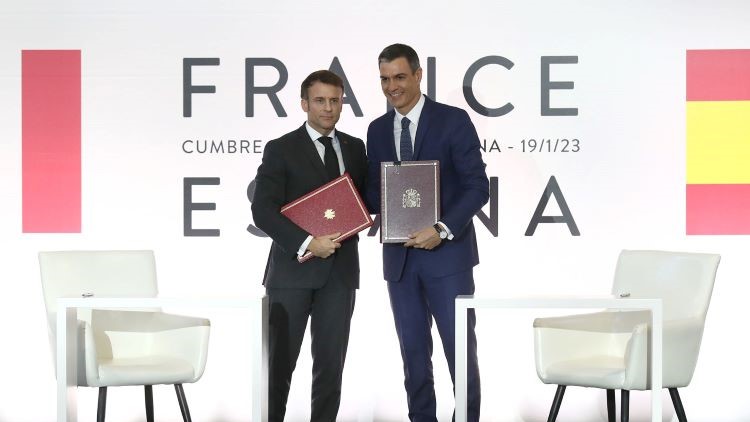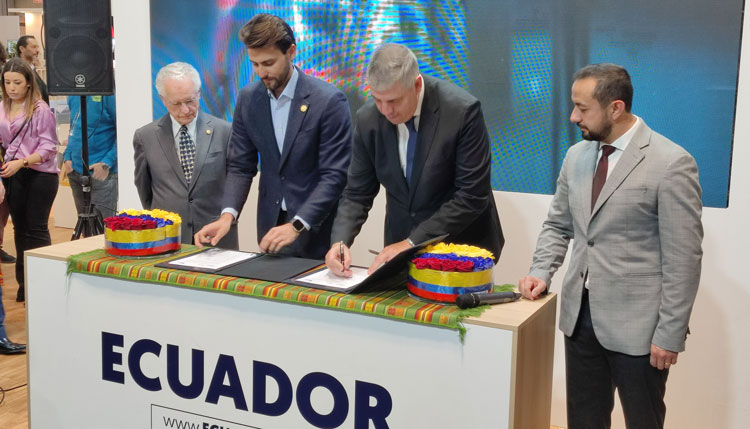Eduardo González
As expected, the XXVII Spanish-French Summit experienced yesterday two very significant fronts in Barcelona: the signing of the new Treaty of Friendship and Cooperation, which raises bilateral relations to the highest level, and the double presence of independence both outside and inside the enclosure, with the institutional participation of the president of Catalonia, Pere Aragonès (who did not stay to the interpretation of the anthems), at the reception and a demonstration outside that clearly exposed the dissensions within the Catalan sovereignty.
During the meeting, held at the National Museum of Art of Catalonia, the President of the Government, Pedro Sánchez, and the President of the French Republic, Emmanuel Macron, signed the Treaty of Friendship and Cooperation, the from now on called “Treaty of Barcelona”, the first of these characteristics signed between the two countries and that, according to Moncloa, constitutes “an unprecedented roadmap for coordination between France and Spain within the European Union and brings efficiency and agility to the development of joint projects and institutionalizes both the annual holding of bilateral summits and the reciprocal participation in councils of ministers”.
The Treaty of Barcelona will raise bilateral relations to the highest possible level, comparable to the one Spain already has with Portugal since the Trujillo Summit in October 2021 and the one France has with Germany and Italy since Aachen in 1963 and Rome in 2021, respectively. The text, negotiated by the two governments in compliance with what was agreed at the previous bilateral summit in Montauban (2021), provides, among other novelties, for the creation of a Franco-Spanish Defense and Security Council made up of the Ministers of Foreign Affairs and Defense, the development of a common framework for international relations, regular meetings between the Ministers of Economy, Industry, Connectivity and Tourism, the holding of an annual business and economic forum, the development of interconnections, the Common Agricultural Policy and the Common Fisheries Policy, and the setting up of a border cooperation committee.
During the summit, according to Moncloa, Sánchez and Macron addressed various bilateral and European issues, such as the need to define a cross-border strategy and to strengthen energy interconnections and the transport network between the two countries, progress in European economic governance, the migration and asylum pact or the reform of the CAP, areas that will be raised by Spain during its Presidency of the Council of the EU. They also analyzed the current evolution of the war in Ukraine and “other common challenges to our security, especially those coming from the southern flank”, as Pedro Sánchez stated at the subsequent press conference.
Energy and interconnections
On the other hand, during the Summit, several bilateral meetings were held between the attending ministers (the three Vice-Presidents of Economy, Labor and Ecological Transition and the Ministers of Foreign Affairs, Defense, Interior, Transport, Education, Agriculture and Culture, together with their French counterparts).
One of the most important bilateral results of the Summit was the commitment of the two countries to work, on the one hand, on their proposals for reforming the European electricity market so that they converge towards a common position and so that the new model is approved before the end of 2023, and, on the other hand, to work together on the package of energy reforms that the European Union will have to undertake, particularly during the Spanish Presidency of the EU Council in the second half of the year, with the aim of having it approved before 2024.
The two governments also pledged to promote energy interconnections and to study the construction of a new power line between the two countries, taking advantage of the underwater route of the H2med hydro-duct between Barcelona and Marseille. “Spain and France want to move forward together in the energy field and thus improve the European project, increase our integration and build a more united, stronger and more sustainable Europe, better prepared to face the challenges ahead and achieve a carbon neutral economy,” said the Third Vice-President of the Government and Minister for Ecological Transition and the Demographic Challenge, Teresa Ribera.
On the other hand, the Ministers of Culture of both countries, Miquel Iceta and Rima Abdul Malak, agreed on a Declaration of Intent that will allow the digitization of important documentary collections on Spanish Republican exiles in France, and the Minister of Agriculture, Fisheries and Food of Spain, Luis Planas, and his French colleague, Marc Fesneau, presented a Joint Declaration that strengthens collaboration in agricultural matters between the two countries.
In addition, the Second Vice-President and Minister of Labor and Social Economy, Yolanda Díaz, signed a Declaration of Intent on Social Economy, and the Minister of Transport, Raquel Sánchez, met with Clément Beaune, France’s Minister Delegate for Transport, with whom she discussed projects such as the Montpellier-Perpignan section, the Mediterranean Corridor and the Atlantic Corridor. During the meeting, Beaune pledged to complete both European rail corridors by 2030 (work on the Mediterranean will begin in 2023 and on the Atlantic in 2024).
“Neither Spain nor France: Catalan Countries”
The great political controversy of the Summit was the merely institutional presence of the President of the Generalitat, Pere Aragonés, who after arriving at the National Art Museum of Catalonia talked for a minute with Pedro Sánchez, was greeted by Macron and left the event in his official car, while the two leaders reviewed the troops and presided over the ceremony with the national anthems of both countries. Afterwards, and in statements to the press, Aragonès justified his presence at the event and the greetings to Sánchez and Macron, but warned that the political conflict in Catalonia “is not over”.
At the press conference after the Summit, Sánchez stated, “I would have liked, obviously, that President Aragonès had stayed for the whole ceremony, but I am grateful, in any case, that, unlike other autonomous presidents, he is present at the reception for President Macron”. Yesterday’s was the first Spanish-French Summit to be held in Barcelona since the institutionalization of this type of meeting in 1987 and the second in Catalonia since the one held in Girona in 2006, in which José Luis Rodríguez Zapatero and Jacques Chirac participated.
Meanwhile, between 6,500 (according to the Guardia Urbana) and 30,000 people (according to the organizers) demonstrated outside against the summit under the slogan (among others) Neither France, nor Spain: Catalan Countries. Among those attending the rally were representatives of the main pro-independence formations, ERC, Junts and CUP. At one point, the participants booed the president of Esquerra, Oriol Junqueras -who was forced to leave the rally-, in protest against the presence of Aragonès (from ERC) at the Spanish-French meeting. The demonstrators shouted slogans such as “Puigdemont, our president” and even “Junqueras, traitor, we want you in prison” (the ERC leader was imprisoned, and subsequently pardoned, for his involvement in the 2017 independence process). Sources from his party assured that he did not leave the rally because of the booing, but because he had a “commitment”.
The protest had been called by ANC, Òmnium Cultural and the Consell per la República with the argument that the Summit has been a “provocation” of the Government of Sánchez to try to demonstrate that the Procés is already part of the past. “We have come to tell Sánchez that nothing is over here, that independence is still very much alive,” Junqueras declared. “We are aware that there is still some way to go, and we will continue to do so inside and outside the Summit,” he added, to justify Aragonès’ participation.







